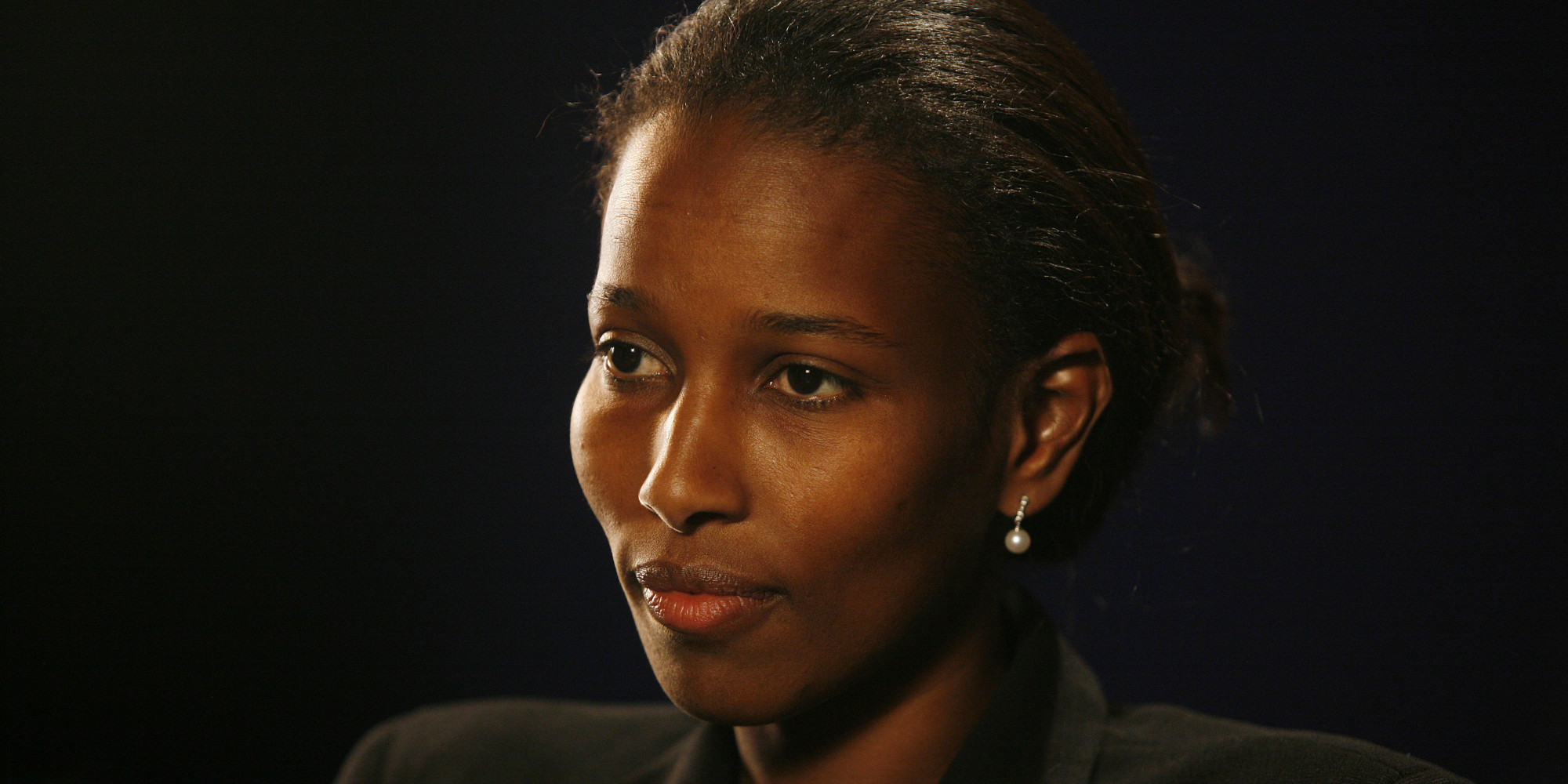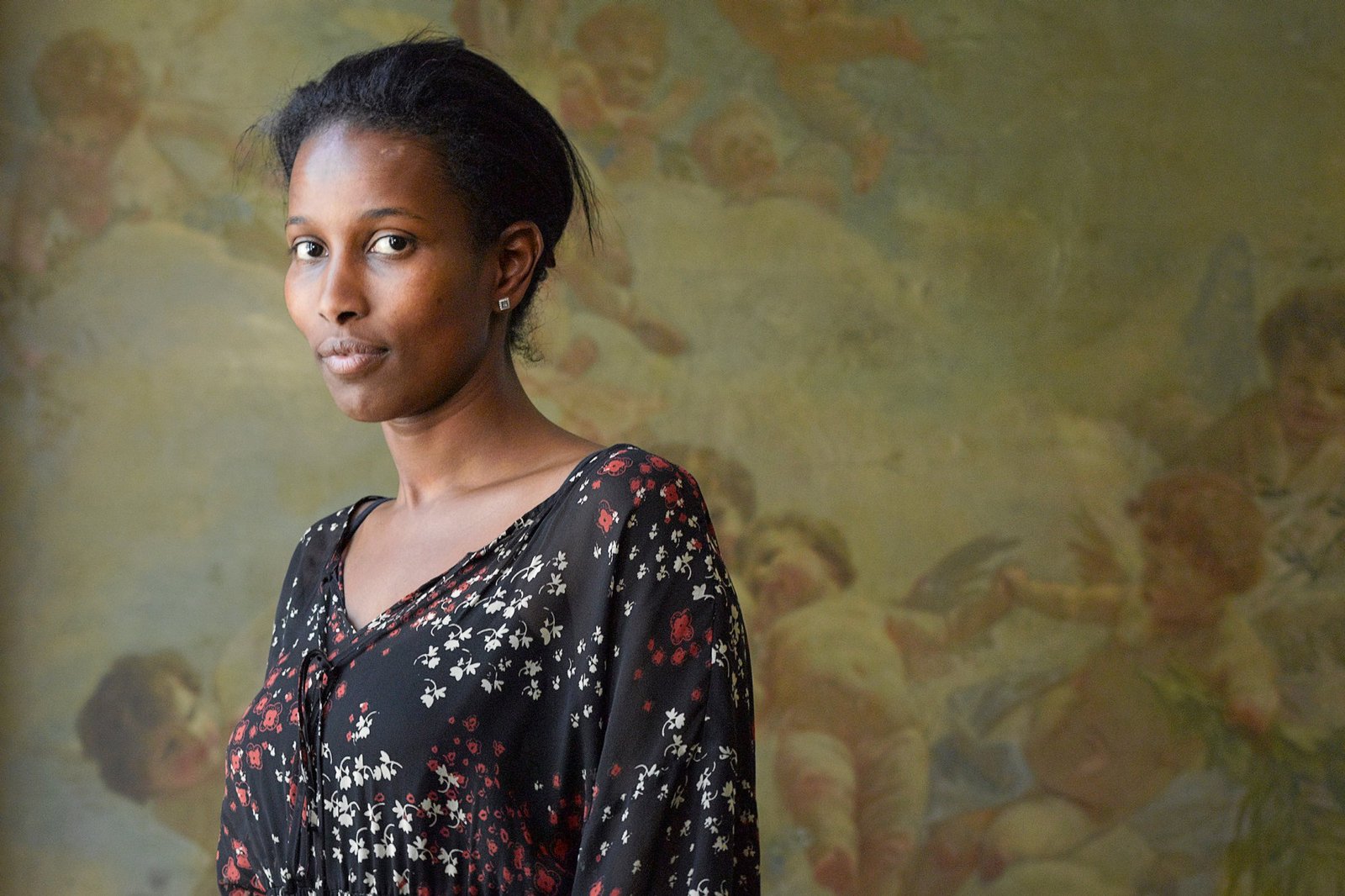Irrespective of whether you agree or disagree with Ayaan Hirsi Ali, she has lived and experienced a world that her critics, by and large, have not.
Prominent author Ayaan Hirsi Ali, founder of the AHA foundation that works to eradicate the practice of female genital mutilation, had to cancel her scheduled Australian tour recently, citing security threats as the reason. The danger faced by Hirsi Ali due to her criticism of Islam, is no surprise and has been previously covered in an extensive piece here. The outcry following the cancellation is slowly dying down, and Hirsi Ali has retaliated to the accusations level against her by a few Muslim women in Australia through a video. Inevitably, pieces both supporting and lauding Hirsi Ali for her work and stances have popped up, along with the invariable list of videos and articles denouncing her as a fraud. These criticisms are being peddled around the internet, with a few brief links promising explosive exposés proliferating on social media.
Take the example of this piece by Max Blumenthal, over at Alternet.org who blandly makes the statement that Hirsi Ali ‘makes stuff up’. After a circuitous argument regarding the source of her statistic where she claims that 70% of the world’s violence is among Muslims, and explaining that the source cannot be verified, Blumenthal reaches the summary conclusion that Hirsi Ali ‘lies’ about too much to be taken seriously. Blumenthal’s own source for his argument on the 70% statistic has now been identified as being employed in the communications, and not in research department of the organisation. He also (cleverly, as he imagines) points out that the majority of ‘deaths’ are due to the Syrian conflict, which is not rooted in religion. Either Blumenthal believes conflict dynamics in Syria before 2012 are irrelevant, or he has conveniently overlooked the sectarian roots and aspects of the Syrian conflict – a divide engendered and sustained by religion. Either way, his attacks on her are so specious so as to be almost laughable.
But this is not a new accusation. Indeed, it would appear that the sum total of all the criticisms of Hirsi Ali amount to the fact that she lied about her circumstances when applying for asylum, and contended that she had been in the Somali civil war in order to qualify for refugee status. This thread of intense criticism, which is then repeated as if it were a debilitating attack on her credentials and her stances, lingers also on the fact that she left Somalia before the age of 10, that she led a comfortable middle class life in Kenya, interspersed with periods in Ethiopia and Saudi Arabia. Since she lied on her asylum claim, her critics argue, she cannot be trusted or relied upon as a thinker and an intellectual.

Let’s examine this argument. That Hirsi Ali lied on her asylum application was well-known to the relevant people at the time she was a politician in the Netherlands. Even her strongest critics grudgingly agree that the VVD, a major political party in the Netherlands and the administration which should have been concerned with the issue, disregarded it. The explosive documentary and the public drama that ensued was inevitable perhaps, but nearly a decade later, why her critics continue to refer to this incident is baffling. Hirsi Ali does not manufacture her books around a claim that she was trapped in the civil war. Quite to the contrary, many of her arguments are drawn from her experiences in Ethiopia, Kenya and Saudi Arabia, where she spent her teenage years. One of the pivotal happenings in her life, that informs her mission and her work, as well as shapes her views and stances was the barbaric practice of female genital mutilation that was inflicted upon her. That fact has not been proven false. Certainly, this damage that she underwent as a child has contributed greatly to her public credibility. If this had been a lie, the constant reference to such a scandal might have been justified. But it isn’t. Further, her public personality, her notoriety, her opinions and views have been clearly represented as being partially derived from her experience as a girl in Islamic society, and not the Somalian civil war. By her own admission and by the proof of her work, with the exception of a statement in the promotion of her first book by Simon and Schuster, she does not claim to have benefited from, or learnt by living through the war. Therefore, the attempts to smear her on that basis seem weak rather than insightful.
There is one particular tale that weaves itself through this narrative that Hirsi Ali is a liar, which I find ironically amusing. Some of the more enterprising of her critics have alleged that her brother had been interviewed and denied she was to be forced into marriage. Forced or child marriage and honour killing is not limited to or exclusive to Muslim majority countries, but ranges across very diverse cultures. What they do have in common however, is that the male members of the family exclusively drive such decision-making and violence – a fact that any women’s rights organisation will attest to. These men will have been known to deny any pertinent fact that will betray their role in their daughter’s or sister’s misery. A few simple searches on the internet will reveal this trend plainly enough. Her detractors contend that in her account of fleeing a forced marriage, it is her word against his. But one must evaluate her claim in light of known and incontrovertible facts about forced marriages, which is that male members are often primary perpetrators. Taking her brother’s word at face value is, therefore, laughably tantamount to allowing an accused to sign his own declaration of innocence.
Some argue that because of her own history as a teenager in a controlling family, Hirsi Ali views the Islamic religion only through the narrow prism of her own experiences and does not capture or understand its entire glory. This argument is obviously also prima facie ridiculous on the face of it. Parents await the teenage years with trepidation since that is precisely when children start to question their lives and their surroundings, and become intensely curious. If there is any stage of childhood where the human being is particularly attuned to social norms and beliefs, observes and compares surroundings and pushes the boundaries, it is the teenage years. Rather than invalidating the value of her experiences therefore, the fact that she shuttled between Islamic societies in three different countries while growing would have enabled her to swiftly observe, compare and contrast the societies, with the sharp perceptions and inquiring mind of a teenager.
Her subsequent exposure to western liberal democracy, secular thought and culture influenced the evolution of her thought process and intellectual positions. The conclusions she comes to are consistent with what can be expected from one who has had such a journey; her contributions are convincing for that very same reason. The story of her growth also indicates why voices like hers are valuable. Hirsi Ali’s greatest contribution is not in her doctrine-based criticism of Islam or the Quran, which other writers have also competently dealt with. Rather, it is her intellectual clarity about the influence of religiosity on the individual human psyche, her perceptive understanding of how it manifests in closed communities, and her reasonable predictions about what such an environment entails that makes her one of the most prolific thinkers in the current geopolitical scenario. It is her intuitive understanding of the myriad influences on migrants’ lives, their choices and thereby their identities in countries with vastly differing cultures that has gained her the following she has. Attempting to discredit her voice, by relying on the fact that she did not spend her adult years among a society she criticises is an extremely weak argument and I suspect her detractors know that.
Hirsi Ali’s memoirs also record in detail her own growth from a girl who accepted the structures and conditioning of her society, to one that questioned its very basis. Astonishingly, some of her critics point to her initial acceptance of her cultural conditioning as invalidating her intellectual insight and that she supposedly adopts the tone she does to profit from the ‘Islamophobia industry’. If changing one’s mind in one’s early twenties is to be regarded as de-legitimising their philosophies, the world would face a massive shortfall of youth-led grassroots movements striving for social justice, made up of young people who introspect on their own upbringing and perceptions with greater clarity. By that metric, Hirsi Ali’s path is not only perfectly logical, it reinforces the importance of her voice as a person who underwent a profound process of introspection and critical thinking to arrive at the conclusions she did.
But the most horrendous attacks against her do not even attempt to cobble together a rational argument and derive its criticism from substance. There is always a fleeting reference to her being a liar, a reference that is as irrelevant as it is a deliberate distraction from her message. She is then called a ‘bigot’, another term that is bandied about with casual recklessness in our discourse. By definition, a ‘bigot’ is someone who is intolerant to all other views, beliefs and opinions. Nothing in Hirsi Ali’s record, her stances or her arguments indicates that she is intolerant towards differing views, and she has never shied away from engagement. The use of such terms is reductive and aggressive, and unbeknown to her critics, exposes them for their inability to engage with her on an intellectual level. There is literally no criticism of her work that deconstructs and invalidates her arguments, the facts in her writing, or her conclusions. The best attempts resort to vague protestations that ‘religion is about interpretation’, ‘all religions have fundamentalist tones’, and an insistence that ‘if practised properly’, said doctrine would be wonderfully harmless and equitable.
The other accusation leveled at her with ease is that of being an Islamophobe. As we’ve described before, the definitions of Islamophobia and Islamophobe seem to be in flux and suffering from a lack of consensus as to their elements. The few universal elements of the definitions demand a hatred or fear of Muslims / Islam, rooted in irrationality. Hirsi Ali’s foundation, and in fact her most strident public appeal, is for greater efforts to eradicate female genital mutilation, a social practice that has been universally condemned and that is still practised to a large extent in Muslim majority countries or communities. Fighting a cultural practice borne of a set of beliefs influenced by a religion, should not be a fight that is unfamiliar to any liberal or social activist, especially in the West. Experiences in the West with fighting homophobia and transphobia should remind her critics that it is possible to condemn a social practice, and criticise its derivation from religious dogma, without being accused of hatred towards the religion itself.
Self-identified ‘liberal’ outlets such as Salon, in their criticism of personalities such as Hirsi Ali and Sam Harris, betray an almost hilarious lack of nuance. On the one hand, the self-awareness that is driving America’s liberal faction is admirable. They recognise the incredible damage wrought by American exceptionalism and aggressive expansionism of its brand of democracy and are, rightly, very wary of intellectuals and politicians espousing the same ideology. However, they assume that everyone whose viewpoints are similar to the dreaded war mongering rhetoric must, of necessity, be wrong. However, there is a subtle distinction. Hirsi Ali’s words may echo those of other commentators known for harmful stances and ideas, but her ideas are derived from a very different sociological standpoint. Everyone’s arguments have to be evaluated for their own merit, and the liberal western establishment, in its paranoia of aggression-friendly philosophies, is starting to conflate and generalise vastly different streams of thought. This over-cautious approach, in turn, is feeding into the perception among centrists, that the liberal faction will dismiss anything that sounds right-wing. Such people therefore feel that liberals are out of touch with political realities, instead preferring to pander to a narrative that paints white people as aggressors, and everyone else as victims. The truth is somewhere in the middle. Any attempt by liberal-leaning activists to explore whether a stream of religious thought may be contributory to violence is overwhelmed by the noise of far-right ideology, which carries the connection to is extreme. Instinctively, liberals push back, and retreat into their defence of cultural relativism, American aggression-ism and painstakingly go overboard to reaffirm their commitment to pluralistic and open-minded principles. This, in turn, confirms the discomfiture of centrists, who deem both sides as being equally closed off, emphasises to people such as Hirsi Ali that certain populations are only viewed as victims, and, fundamentally, disables communities from introspection.
Certainly, Hirsi Ali has not pulled any punches in her criticism of Islam, and can be justifiably said to have denounced it in no uncertain language. Reasonable people can challenge her on some of her views, and it may be said that she is uncharacteristically harsh for a public intellectual. Yet by that metric, so is Noam Chomsky, perhaps the most celebrated American intellectual known for his condemnatory opinions on US foreign policy. Sadly however, Hirsi Ali’s critics and enemies know that the internet affords them an almost beatific opportunity to cherry-pick her statements, lampoon them without context and never have to actually face those capable of countering their arguments. Hirsi Ali’s calmness and precise clarity is in stark contrast to the loosely formulated emotional diatribes that often accuse her of attempting to represent the totality of the female Muslim experience- a claim that is as silly as it is false. No one individual can ever represent the range of interests and views of millions of women. Hirsi Ali has never claimed to do so. Rather, her own position has been constant – she challenges the state of women in countries where they are deprived of their voices, autonomy and access to channels wherein they can protest their plight. By attacking Hirsi Ali, her critics betray their self-obsessed concern with their own self-perception in the West, rather than evincing any concern for the women Hirsi Ali and her work focus on.
Finally, Youtube personalities such as Omar Baddar have also accused her of vile and poisonous rhetoric, of fanning Islamophobia, and of legitimising far right paranoia. She has supposedly, therefore, helped in exposing peaceful, innocent Muslims to danger. To this accusation, I have but one query – Can any damage wrought by Hirsi Ali’s criticism of Islam be worse than the damage caused by ISIS, its ideology, and the actions of persons all over the world who have engaged in ‘lone wolf’ attacks? The rising climate of fear and anger towards Muslims, if predictable, is profoundly tragic and worrying. However, it is undeniably more due to the deaths and tears wrought by terrorists, rather than the words of a woman whose work continues to circulate primarily among only a certain class in society. Do they imagine that the attacker in Quebec for instance, derived inspiration for his rage from Hirsi Ali’s measured dissection of Islamist thought, or was it borne of a hysteria achieved by a steady and thorough process of radicalisation? I suspect her critics know the answer and know that her work, while uncomfortable to practising Muslims, is not wont to provoke murderous rage. But it is more convenient to blame her for the ‘deaths’ of people, rather than to malign her for hurting religious sentiments. Her enemies merely resort to the argument which is more prone to evoking an emotional response.
Why do I write this piece, when Hirsi Ali has plenty of supporters who respect and engage with her arguments? There is a fundamental dissonance with a discourse where ‘liberal elites’, who claim to respect the authenticity of experience and origin, and who champion the idea of voices from marginalised communities, refuse to listen to them when it does not fit their preconceived notions. It is a damaging sign to the countless women, not only in Muslim communities but in multiple cultures and religions, who are battling social norms and structures in their own countries to find voices like Hirsi Ali’s shut down. Many of us are in this category, of having observed little girls forced into conditions and lives beyond their control, and railing against social structures that produce this situation. Irrespective of whether you agree or disagree with voices such as hers, they have lived and experienced a world that their critics, by and large, have not. This is simply not exchangeable. By all means, challenge Hirsi Ali and those who share her views. However there is an invaluable authenticity to her vision that the rest of the world, including nationalists and scholars, should be reluctant to dismiss.








Article Discussion